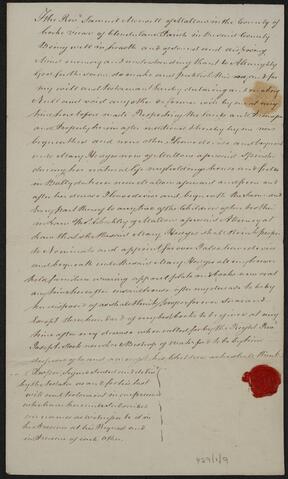
Identity area
Reference code
Title
Date(s)
- [c. 1800-1813?] (Creation)
Level of description
Extent and medium
2 pp.
Context area
Name of creator
Biographical history
The Monsells, of French extraction, were a plantation family from Dorsetshire, England, who had settled in Tervoe, county Limerick by the 1660s. Many of the early members of the family were prosperous merchants and landowners, most notably Samuel Monsell (d. 1735), a shipping merchant whose business extended from Ireland to England, France, Holland and Spain. Of his several sons, the eldest, William (1705-1772) became a lawyer. His second marriage in 1751 to Dymphna Pery (d. 1774), sister of Edmond Sexton Pery, MP and three-time Speaker of the Irish House of Commons, gave the Monsells not only a distinguished pedigree but considerable political influence. Their son, Colonel William Thomas Monsell (1754-1836), married Hannah Strettell of Dublin, whose father Amos Strettell was director of the Bank of Ireland. Their younger son, Thomas, became Archdeacon of Derry and was father to the noted hymnologist John Samuel Bewley Monsell and to the celebrated botanical artist Diana Conyngham Ellis née Monsell. Colonel Monsell’s elder son, William, was grandfather to and namesake of the distinguished politician William Monsell (1812-1894). His first wife, Anna Maria Wyndham Quin (1814-1855), whom he married in 1836, was daughter of the second Earl of Dunraven of Adare Manor, county Limerick, then one of the wealthiest men in Ireland. William Monsell was created 1st Baron Emly of Tervoe in 1874. The title became extinct on the death of his only surviving son, Thomas William Gaston Monsell (1858-1932), from his second marriage to Berthe de Montigny Boulainvilliers (d. 1890).
Archival history
Immediate source of acquisition or transfer
Content and structure area
Scope and content
Last will and testament of the Reverend Samuel Monsell, in which he bequeaths his house in Ballydaheen, Mallow and all its contents to Mary Hodges of Mallow, spinster, for her natural life, except for three hundred of his best books, which he bequeaths to the Right Reverend Joseph Stock, Lord Bishop of Waterford ‘to be by him disposed of to and amongst his Children as he shall think Proper’. The will bears Samuel Monsell’s seal but has not been signed, nor is it written in Monsell's hand, and was presumably never executed. A note on the reverse states: ‘Testamentary Paper found in the Iron chest of the late Samuel Monsell in Waterford 7 November 1818 – Daniel Henry Wall’.
Appraisal, destruction and scheduling
Accruals
System of arrangement
Conditions of access and use area
Conditions governing access
Conditions governing reproduction
Language of material
- Béarla
Script of material
Language and script notes
Physical characteristics and technical requirements
Finding aids
Allied materials area
Existence and location of originals
Existence and location of copies
Available digitally on the University of Limerick Digital Library at https://doi.org/10.34966/uldl.9mtp-q371
